Moving ventilation in the kitchen: regulatory requirements for venting
Typical housing can be made more comfortable for living. And in order to achieve the desired result, we are ready to perform even complex and unfamiliar work, which includes the transfer of ventilation in the kitchen. Is that right?
But the lack of knowledge about the intricacies of such work and their legitimacy can lead to disastrous consequences. Therefore, in order to achieve the desired result and avoid mistakes, you need to familiarize yourself with the norms and rules of transferring the ventilation hole.
In our article, we will analyze these issues in detail, paying attention to the regulatory framework governing the transfer of ventilation, as well as the responsibility of the owner of the apartment in case of violation of the redevelopment rules.
The content of the article:
The main hazards of the transfer hood
The process of air exchange in residential and public buildings serves to ensure optimal or acceptable microclimate parameters. And these are not just words, but a requirement set forth in a document such as GOST 30494-2011. Therefore, air exchange must always be present and be effective - this is already mentioned in SP 60.13330.2016.
That is, the transfer of the hood provided by the project in the kitchen should not interfere with the ventilation system to perform its functions. Otherwise, comfort and living conditions will deteriorate sharply. And in severe cases, living in a room with an ineffective ventilation system will be impossible.
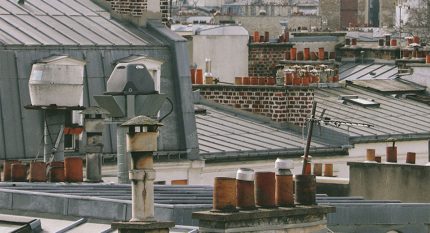
Since the lack of air exchange will lead to:
- humidity increase;
- eliminates the removal of excess heat.
And this, in turn, will create optimal conditions for development in housing mold, colonies of fungithat lead to acute respiratory diseases, as well as asthma, complex allergic manifestations.But such situations cannot be allowed and this is stated in a number of documents, for example, in the capital, this is the Decree of the Government of Moscow PP No. 508.
In addition, impaired air exchange reduces, and significantly, the safety of living. Since the kitchen ventilation system will not be able to quickly and in the right amount remove hazardous substances from the room. For example, carbon monoxide or unburned natural gas. With any of these options, the consequences can be catastrophic. We recommend that you read the ventilation rules in houses with gas stoves.
In addition, inefficient air exchange will not ensure the removal of dangerous substances from housing or other premises that are emitted during the life of tenants (for example, carbon dioxide), as well as from building materials, carpets, plastic parts of modern windows, household and any other equipment, and finishing materials. What provokes a number of serious diseases. So, it is not for nothing that plastic windows are called slow killers.
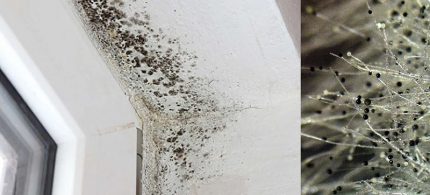
As a result, when performing a ventilation transfer, operations that could lead to the negative points listed above should be avoided.
Stages of proper ventilation transfer
Since the transfer of ventilation is a responsible procedure, all its important points are legally regulated. Moreover, the state gave the regional authorities the opportunity to publish regulatory documents on their own. And the most famous of them is the above-mentioned Resolution 508-PP.
It says that it is prohibited:
- change the design of the ventilation system;
- reduce the cross section of any ventilation ducts.
In addition, this bylaw states that any actions with elements of the ventilation system are redevelopment. Therefore, for its implementation, it is necessary to go through coordination, that is, obtain permission to perform work. Why you should contact the housing inspectorate at your place of residence.
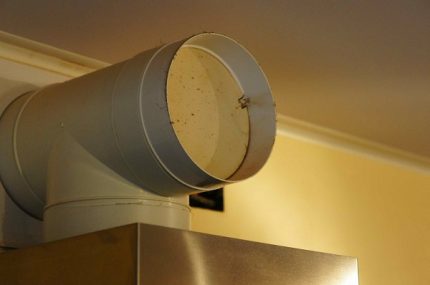
Stage # 1 - Re-Planning Approval
In order to obtain permission to work, the owner of the apartment, other premises should get technical conclusion, which confirms that all work is safe.
And also this document will indicate that the technical characteristics and performance of the ventilation system will not get worse.
You should also be aware that a technical report can be issued:
- the organization that performed the design of the ventilation system, if during the redevelopment the bearing structures of the building are affected, for example, this is true for houses of the I209A, II-18 series;
- any organization involved in the design, if during the redevelopment of the ventilation system the supporting structural elements of the building will not be affected.
Next should be filed application for redevelopment of the ventilation system to the nearest housing inspection authority.

The following document must be attached:
- technical conclusion;
- redevelopment project (in 2 copies).
- technical passport from BTI.
In addition, you will need to prove your identity, for which you need to have a passport with you. It should also be confirmed that the applicant is the owner of the premises where the work is planned.
Responsible persons of the housing inspection have the right to make a number of decisions:
- allow redevelopment;
- to ban redevelopment;
- refuse to accept the application - this happens if it is planned to carry out explicitly prohibited work or documents are incorrectly executed.
In case of refusal, representatives of the housing inspectorate are required to indicate the reason, as well as ways to eliminate the deficiencies (if possible).
Stage # 2 - getting permission from neighbors
Any ventilation system is a common property. That is, it does not belong to the owner of some apartment in the house. This is stated in Art. 36 Housing Code.
As a result, even when permission to redevelopment is obtained, you still need to contact each neighbor and get his consent or disagreement to carry out the work. In total, at least 73% of residents should approve the initiative.
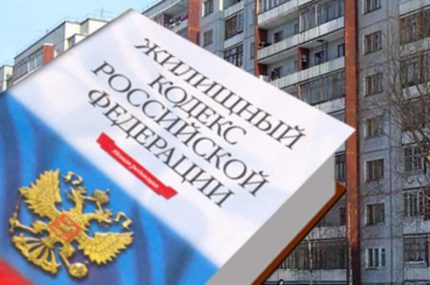
Moreover, it is possible to transfer the ventilation grill in the kitchen only after the permissions are issued in writing.
Responsibility for violation of transfer rules
Due to low literacy or unwillingness to spend money on the procedure for redevelopment, the owners of the premises often change the design themselves, moving the grill or drilling air duct.
But in this case, it should be understood that if such a redevelopment is discovered, it will be necessary to “reap the benefits” in the form of associated risks and responsibility for the deed.
And the following can happen:
- redevelopment will not affect the efficiency of the ventilation system;
- replanning will reduce the operability of the ventilation system and this will be revealed.
Since any of these options can significantly affect the comfort of living, financial stability, you should familiarize yourself with them in more detail.
Option # 1 - “unnoticed” redevelopment of the system
It so happens that all illegal actions to redevelop ventilation will get away with it. And there will be no consequences for the violator.
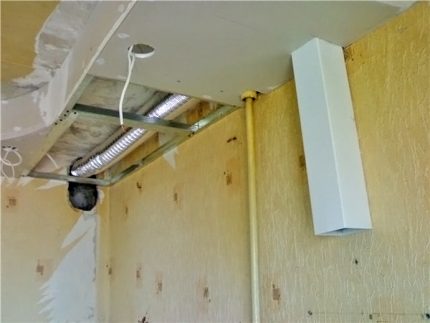
But you must remember that everything can change for the worse at any time.
For example, old neighbors who did not attach importance or did not want to scandal because of deteriorating living conditions can sell their homes. And new residents, having identified the problem, will immediately turn to the housing inspection.
It so happens that the redevelopment of ventilation in the kitchen will lead to minor changes, but one of the neighbors will also decide to improve the ergonomics of their apartment due to common house property. Which, in aggregate, will lead to a deterioration in the living of all users of the ventilation system.
Problems with the owners of the premises may also begin at the visit of gas workers, representatives of the management company, who may notice an illegal redevelopment.
Moreover, in any of these cases will have to bear responsibility. So, when it comes to the housing inspection, a fine will be issued immediately, the amount of which will be 2-2.5 thousand rubles. Few? Do not rush to rejoice, as this is a punishment for the illegal redevelopment itself. And still it will be necessary to eliminate its consequences, which representatives of the housing community will immediately demand that they be implemented.
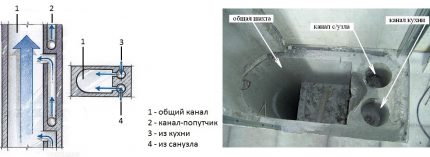
Moreover, it just doesn’t work to move the ventilation hole to its old place, not knowing whether it is possible to do this - initially it will be necessary to find out this moment. Why do you have to contact the organization that made the project system. And it will be definitely expensive.
The recovery procedure will be even more costly if for some reason the violator decides to ignore the request. Since the apartment can be sold. And do it on the basis of Art. 87 Federal Law 229-ФЗ, regulating the scope of enforcement proceedings.
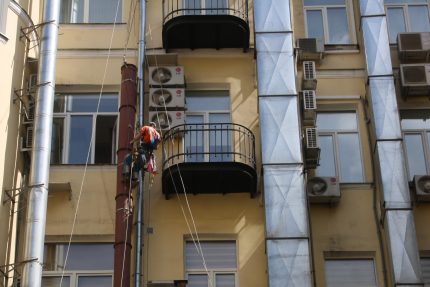
Option # 2 - redevelopment disrupted air exchange
But redevelopment can disrupt air exchange, for example, smell dishes prepared by you will penetrate other residents.
When the neighbors find that the air circulation is disturbed or altogether stopped, they may make angry demands to fix the problem. They should not be ignored, since they are legal.
And, if the neighbors do not succeed, then they can move on to more aggressive methods, both legal and not.
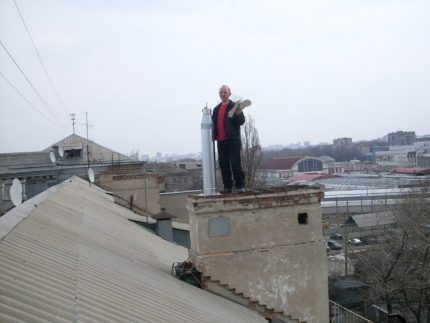
Legal methods to combat violations include appeals:
- to the management company;
- to the housing inspection;
- to court.
And then it will be as described in the previous paragraph. That is, they will immediately write out a fine, then they will demand to restore the ventilation system. If you ignore the requirements, the premises will be sold.
But sometimes they choose an illegal method. In this case, embittered tenants most often block the ventilation system channels (for example, building foam, polyethylene), destroy structures built during redevelopment, etc.
Conclusions and useful video on the topic
In the video below, an illiterate "specialist" talks about how to "correctly" change the design of the ventilation system in the kitchen. But at the same time, the screen shows that the actions are illegal.
For example, they dismantled the ventilation duct, which is absolutely impossible, and violated the integrity of the duct structure. Moreover, all of the above is carried out without coordination of the project. The housing inspectorate will simply refuse to accept an application for redevelopment, which sets out a request to allow the work listed above.
The following video demonstrates what will happen if an illegal redevelopment of a ventilation system is detected:
Remodeling the design of any ventilation system is a responsible, expensive and time-consuming procedure. Therefore, in most cases, it should be abandoned. And, if, nevertheless, a decision is made to carry out the planned work, then the methods should be legal. Since otherwise you will have to bear responsibility for your actions.
You were engaged in the transfer of the ventilation hole and want to tell other visitors to our site about your experience? Share your experience, add unique photos, participate in discussions - the feedback block is located below this publication.

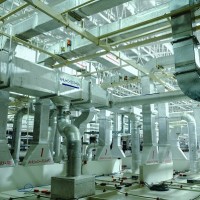 Requirements for ventilation of public buildings: subtleties of arrangement and design of ventilation
Requirements for ventilation of public buildings: subtleties of arrangement and design of ventilation 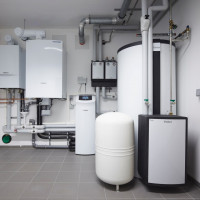 Requirements for the ventilation of a gas boiler: standards and features of the system assembly
Requirements for the ventilation of a gas boiler: standards and features of the system assembly 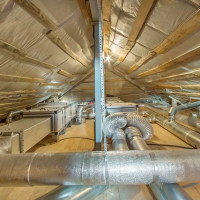 Private house ventilation standards: device requirements and calculation examples
Private house ventilation standards: device requirements and calculation examples  Requirements for air humidity in the catering unit: norms and rules for arranging ventilation in the catering unit
Requirements for air humidity in the catering unit: norms and rules for arranging ventilation in the catering unit 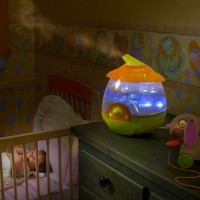 Temperature and humidity in rooms for children: normative indicators and methods for their normalization
Temperature and humidity in rooms for children: normative indicators and methods for their normalization 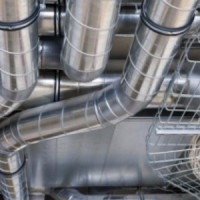 Arrangement of ventilation to the ceiling: types of ventilation systems and features of their arrangement
Arrangement of ventilation to the ceiling: types of ventilation systems and features of their arrangement 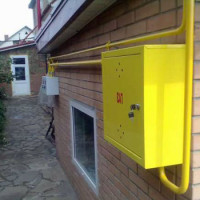 How much does it cost to connect gas to a private house: the price of organizing gas supply
How much does it cost to connect gas to a private house: the price of organizing gas supply  The best washing machines with dryer: model rating and customer tips
The best washing machines with dryer: model rating and customer tips  What is the color temperature of light and the nuances of choosing the temperature of the lamps to suit your needs
What is the color temperature of light and the nuances of choosing the temperature of the lamps to suit your needs 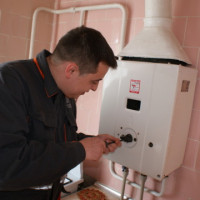 Replacement of a geyser in an apartment: replacement paperwork + basic norms and requirements
Replacement of a geyser in an apartment: replacement paperwork + basic norms and requirements